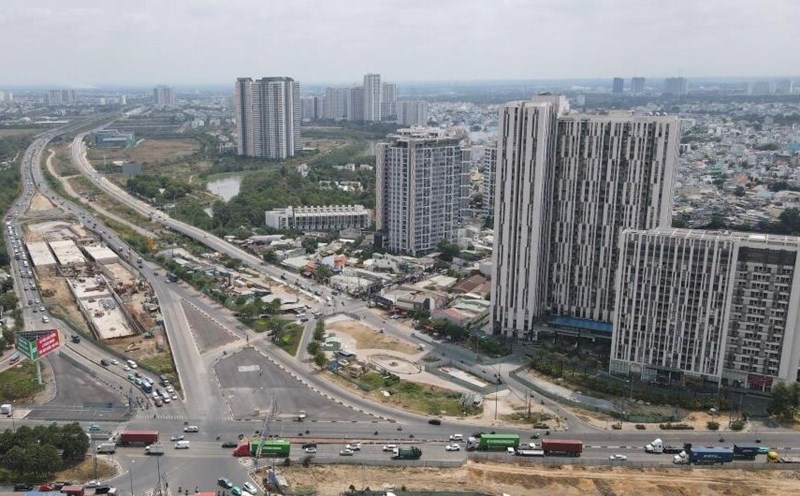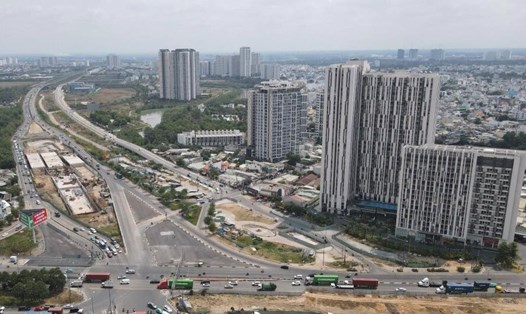The draft amending and supplementing Decree 103/2024/ND-CP, which is being consulted by the Ministry of Finance, still maintains the regulation on paying additional land use fees and land rents of 5.4%/year for the period of waiting for price determination as prescribed in Articles 50 and 51 of Decree 103 above, although this delay does not come from the enterprise.
Speaking to Lao Dong Newspaper reporters about this issue, Mr. Le Hoang Chau - Chairman of the Ho Chi Minh City Real Estate Association - said that keeping this regulation unreasonable and causing injustice to businesses that are not at fault in late determination of financial obligations for land.
In reality, there are many cases where the delay in determining land use fees, land rents or the delay in determining land use fees, land rents (additional) is the responsibility of competent state agencies.
The leader of a real estate group in Ho Chi Minh City also said that his difficult situation is related to land use fees. Almost all of this group's projects have not been developed for less than 7 years, with some projects lasting 10 years, 15 years. The most tiring thing is waiting to determine the exact amount of land use fees to be paid.
There is a project of this group implemented since 2018 with the land use fee calculated at more than 1,600 billion VND, which has now increased to 3,800 billion VND. However, that is still only temporary. With the new land price list still unknown whether it will increase or not. The longer the legality is, the higher the interest cost, the costs continue to increase, but it is still difficult to finalize the most effective business plan.
The reason for the slow land valuation and the "huge" increase in land use fees, according to businesses, is due to many inadequacies in the calculation method. The problem here is that state agencies always want the largest revenue and lowest cost to issue the highest land use fee, while businesses want valid costs and appropriate revenue. This conflict makes it difficult for both businesses and management agencies.
"A business is only "faulty" in cases where the tax authority has notified land use fees, land rents or determined land use fees, land rents (supplements) and within the prescribed time limit, the business fails to fulfill this financial obligation and will be fined for late payment according to the provisions of the law on tax," Mr. Chau stated his opinion.
In addition, according to HoREA, the Land Laws issued before August 1, 2024 (the effective date of the 2024 Land Law), including the Land Laws 1993, 2003 and 2013, do not stipulate the obligation to pay additional fees for the period not yet determined for land use fees and land rents.
Moreover, Points a, b and c, Clause 2, Article 257 of the 2024 Land Law also clearly stipulate that cases that have been allocated land or leased land before the effective date of the 2024 Land Law shall comply with the policy of collecting land use fees, land rents and land prices determined at the corresponding time before August 1, 2024.
Mr. Le Hoang Chau proposed that the Ministry of Finance should only regulate the calculation of additional land use fees from August 1, 2024 until the date of the decision approving land prices, deducting about 180 days from the deadline for determining land prices according to the provisions of Clause 4, Article 155 of the 2024 Land Law. In cases before that time, the regulation needs to be amended in the direction of not charging additional fees for the period of time when the land price has not been determined.
Lawyer Nguyen Dang Tu (Ho Chi Minh City Bar Association) also expressed the view that if the delay in land valuation does not come from the enterprise, it is unreasonable to collect an additional 5.4% per year. The enterprise cannot decide on the time for land valuation, so collecting additional land use fees is not correct. The regulation on collecting additional land use fees invisibly increases costs, pushing up real estate prices. This is going against the policy of supporting businesses, such as reducing taxes and exempting land rent according to current resolutions.











